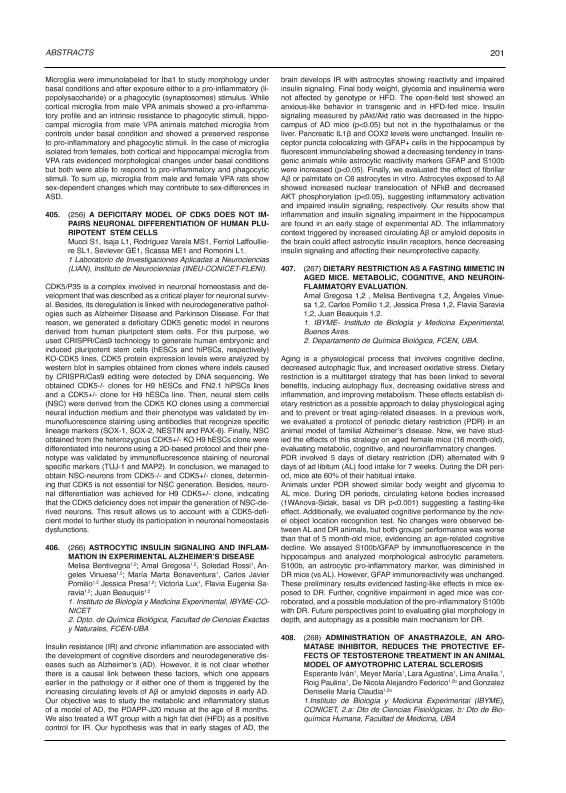Evento
A deficitary model of CDK5 does not impairs neuronal differentiation of human pluripotent stem cells
Mucci, Sofia ; Isaja, Luciana
; Isaja, Luciana ; Rodríguez Varela, Maria Soledad
; Rodríguez Varela, Maria Soledad ; Ferriol Laffouillere, Sofia Lujan
; Ferriol Laffouillere, Sofia Lujan ; Sevlever, Gustavo; Scassa, Maria Elida; Romorini, Leonardo
; Sevlever, Gustavo; Scassa, Maria Elida; Romorini, Leonardo
 ; Isaja, Luciana
; Isaja, Luciana ; Rodríguez Varela, Maria Soledad
; Rodríguez Varela, Maria Soledad ; Ferriol Laffouillere, Sofia Lujan
; Ferriol Laffouillere, Sofia Lujan ; Sevlever, Gustavo; Scassa, Maria Elida; Romorini, Leonardo
; Sevlever, Gustavo; Scassa, Maria Elida; Romorini, Leonardo
Tipo del evento:
Reunión
Nombre del evento:
LXVI Reunión Anual de la Sociedad Argentina de Investigación Clínica; LXIX Reunión Anual de la Sociedad Argentina de Inmunología; LIII Reunión Anual de la Asociación Argentina de Farmacología Experimental y XI Reunión Anual de la Asociación Argentina de Nanomedicinas
Fecha del evento:
17/11/2021
Institución Organizadora:
Sociedad Argentina de Investigación Clínica;
Sociedad Argentina de Inmunología;
Asociación Argentina de Farmacología Experimental;
Asociación Argentina de Nanomedicinas;
Título de la revista:
Medicina (Buenos Aires)
Editorial:
Fundación Revista Medicina
Idioma:
Inglés
Clasificación temática:
Resumen
CDK5/P35 is a complex involved in neuronal homeostasis and de- velopment that was described as a critical player for neuronal surviv- al. Besides, its deregulation is linked with neurodegenerative pathol- ogies such as Alzheimer Disease and Parkinson Disease. For that reason, we generated a deficitary CDK5 genetic model in neurons derived from human pluripotent stem cells. For this purpose, we used CRISPR/Cas9 technology to generate human embryonic and induced pluripotent stem cells (hESCs and hiPSCs, respectively) KO-CDK5 lines. CDK5 protein expression levels were analyzed by western blot in samples obtained from clones where indels caused by CRISPR/Cas9 editing were detected by DNA sequencing. We obtained CDK5-/- clones for H9 hESCs and FN2.1 hiPSCs lines and a CDK5+/- clone for H9 hESCs line. Then, neural stem cells (NSC) were derived from the CDK5 KO clones using a commercial neural induction medium and their phenotype was validated by im- munofluorescence staining using antibodies that recognize specific lineage markers (SOX-1, SOX-2, NESTIN and PAX-6). Finally, NSC obtained from the heterozygous CDK5+/- KO H9 hESCs clone were differentiated into neurons using a 2D-based protocol and their phe- notype was validated by immunofluorescence staining of neuronal specific markers (TUJ-1 and MAP2). In conclusion, we managed to obtain NSC-neurons from CDK5-/- and CDK5+/- clones, determin- ing that CDK5 is not essential for NSC generation. Besides, neuro- nal differentiation was achieved for H9 CDK5+/- clone, indicating that the CDK5 deficiency does not impair the generation of NSC-derived neurons. This result allows us to account with a CDK5-defi- cient model to further study its participation in neuronal homeostasis dysfunctions.
Palabras clave:
CDK5
,
NEURONAL DIFFERENTIATION
,
HUMAN PLURIPOTENT STEM CELLS
Archivos asociados
Licencia
Identificadores
Colecciones
Eventos (INEU)
Eventos de INSTITUTO DE NEUROCIENCIAS
Eventos de INSTITUTO DE NEUROCIENCIAS
Eventos(SEDE CENTRAL)
Eventos de SEDE CENTRAL
Eventos de SEDE CENTRAL
Citación
A deficitary model of CDK5 does not impairs neuronal differentiation of human pluripotent stem cells; LXVI Reunión Anual de la Sociedad Argentina de Investigación Clínica; LXIX Reunión Anual de la Sociedad Argentina de Inmunología; LIII Reunión Anual de la Asociación Argentina de Farmacología Experimental y XI Reunión Anual de la Asociación Argentina de Nanomedicinas; Argentina; 2021; 1-5
Compartir



